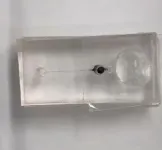(Press-News.org) Gene and cell therapies are among the most important innovations in the healthcare sector. And they reflect advances in science and technology. They have the potential to radically reshape the treatment of cancer, autoimmune diseases, neurodegenerative disorders, and many rare genetic conditions. But the path to approval and clinical use of these products is long and often fraught with difficulty.
That was the reason the European University Hospital Alliance (EUHA) founded the European Center for Cell and Gene Cancer Therapies (EUCCAT) four years ago. The center’s aim is to facilitate the clinical use of ATMPs developed at higher education institutions and further consolidate the basic research conducted in Europe. The newly launched JOIN4ATMP project originated with the virtual institute. All members of the EUHA, together with the existing EU-funded RESTORE and T2EVOLVE networks, biotech companies, and patient advocacy organization EURORDIS – Rare Diseases Europe, will work together to identify obstacles and propose solutions geared toward real-world practice – so that these innovative treatments are made affordable and accessible to all patients.
“Living” medications
ATMPs are based on genes, tissue, or cells, so they often contain living components. For example, it is possible to take white blood cells from a patient with leukemia and genetically modify them in a lab so that, once reintroduced into the body, they can detect and destroy cancer cells. ATMPs can be tailored to individual patients more effectively than traditional medications, which makes them especially suitable for treating rare diseases and cancers that currently have no or inadequate treatment options.
Although there are many ATMPs currently in development, very few have been approved for the European market to date. The problem is that the regulatory rules for approval of conventional medicinal products – which require clinical trials involving large numbers of patients, for example – do not translate to these complex gene and cell therapies.
Reshaping the landscape
This is where JOIN4ATMP, which is slated to receive about three million euros in funding from the European Commission over a three-year period, comes in. “Our goal is to devise concrete recommendations for how patients in Europe can gain access to innovative gene and cell therapies faster,” says Prof. Annette Künkele-Langer of the Department of Pediatric Oncology and Hematology at Charité, which is leading the consortium. “To that end, we are bringing knowledge and experience in preclinical development, production, clinical testing, market approval, and reimbursement of ATMPs together Europe-wide and analyzing the obstacles and how they can be overcome at the medical, regulatory, and economic levels.” The experts will present their conclusions in the form of guidelines, recommendations, and white papers, thereby advancing the European strategy for novel therapies. They will form the basis for new approval processes tailored to ATMPs and create the overall conditions needed for standardized, decentralized manufacturing of gene and cell therapies even as the application of rigorous good manufacturing practices (GMPs) is expanded at the European level.
About EUHA
The European University Hospital Alliance is made up of ten leading European university hospitals with demonstrated excellence in healthcare, education, and research: Aarhus University Hospital, Denmark; Greater Paris University Hospitals, France; Charité – Universitätsmedizin Berlin, Germany; Erasmus MC, Rotterdam, Netherlands; Ospedale San Raffaele, Milan, Italy; Karolinska University Hospital, Stockholm, Sweden; King’s Health Partners, London, UK; University Hospitals Leuven, Belgium; University Hospital Vienna & Medical University of Vienna, Austria; and Vall d’Hebron Barcelona Hospital Campus, Spain. The institutions work together to improve patient care now and in the future. All members have a capacity of more than 1,000 beds and are centers of excellence in research as well as national reference centers. They cover the existing European Reference Networks (ERNs). The alliance’s motto, “Leading by Doing,” stands for its intention to be a capable advisor at the European level and develop innovative solutions for central challenges in the European healthcare sector.
For further information:
Künkele Lab
EUCCAT
European University Hospital Alliance (EUHA)
EUHA activities led by Charité
END
For faster access to gene and cell therapies in Europe
EU-funded JOIN4ATMP project aims to overcome regulatory obstacles
2024-02-25
ELSE PRESS RELEASES FROM THIS DATE:
Scientists deliver portable total chemical analysis without pumps and tubes
2024-02-24
Tokyo, Japan – Researchers from Tokyo Metropolitan University have engineered a new micro total analysis system that quantifies a target chemical in a microfluidic chip without pumps, tubes, and expensive detectors. The compound reacts with other chemicals to produce a gas, pushing ink in a connected chamber along a channel. Built-in light detectors help measure the flow speed, allowing measurement of the original chemical. The portability of the new device enables bedside, quantitative clinical analysis.
Microfluidics is a revolutionary technology delivering precision chemistry with vastly less chemicals. ...
A very long, winding road: Developing novel therapeutics for metastatic tumors
2024-02-23
“Given that the MET inhibitor capmatinib caused a remarkable response in Dr. Blagosklonny, a pertinent question remains as to why he was not treated with ‘preemptive drug combinations’ [...]”
BUFFALO, NY- February 23, 2024 – A new editorial paper was published in Oncoscience (Volume 11) on February 9, 2024, entitled, “A very long and winding road: developing novel therapeutics for metastatic tumors.”
In this editorial, researcher Paul Dent from the Department of Biochemistry and Molecular Biology at Virginia Commonwealth University writes that tumors that ...
Unlocking health: How In Our DNA SC is pioneering genetic screening for South Carolinians
2024-02-23
Physicians and scientists have known for many years that our genetics not only shape our physical features like our smiles but also our risk for developing certain diseases.
The problem? Most people don’t know if they have inherited these genetic risk factors for disease.
In Our DNA SC, a statewide genomic screening program launched by the Medical University of South Carolina (MUSC), aims to change that.
The program, the first and only program of its kind in the Southeast, is led by Caitlin G. Allen, Ph.D., a ...
Down Under Demo: ONR touts additive manufacturing tech at Australian event
2024-02-23
ARLINGTON, Va.—The Office of Naval Research (ONR) — and its international arm, ONR Global — participated in the recent Autonomous Warrior 2023 (AW23) exercise, located at HMAS Creswell in Jervis Bay, Australia.
AW23 brought together Australian military allies, as well as industry and international partners, to demonstrate various technologies designed to help the Royal Australian Navy strengthen its capabilities in the area of undersea warfare — including uncrewed (also called unmanned) and autonomous systems, artificial intelligence and machine learning, and logistics, ...
Study shows benralizumab is effective as a treatment for eosinophilic granulomatosis with polyangiitis, a rare form of vasculitis
2024-02-23
Researchers have shown that the drug benralizumab is as effective and safe as mepolizumab for inducing remission in patients with eosinophilic granulomatosis with polyangiitis (EGPA) according to a study published today in The New England Journal of Medicine. The results of the non-inferiority study were presented at the American Academy of Allergy, Asthma & Immunology annual meeting in Washington, D.C., by Michael Wechsler, M.D., pulmonologist, director of The Cohen Family Asthma Institute at National Jewish Health and lead author of the paper.
EGPA is a rare form of vasculitis, characterized by inflammation in the small blood vessels. This inflammation ...
Researchers identify new choice of therapy for rare autoimmune disease EGPA
2024-02-23
An international team, including researchers from McMaster University and St. Joseph’s Healthcare Hamilton, has identified a new therapeutic for patients with a rare autoimmune disease called eosinophilic granulomatosis with polyangiitis (EGPA). A biologic drug called benralizumab has been shown to be non-inferior to mepolizumab in the treatment of EGPA.
In a clinical trial involving 140 patients with the rare disease, researchers directly compared two biologic drugs, mepolizumab and benralizumab. Patients received monthly subcutaneous injections of either 300 mg of mepolizumab or 30 mg of benralizumab for one year. The findings of the trial were published on Feb. 23, 2024, in the New ...
Powering nitrogenases
2024-02-23
Nitrogenases are considered promising candidates for the sustainable enzymatic production of ammonia and carbon compounds. Unfortunately, one bottleneck in this complex process, the supply of electrons to the enzymes, has remained a mystery until now. Now a team at the Max Planck Institute for Terrestrial Microbiology in Marburg has discovered two essential electron carriers which play a key role in determining the performance of iron (Fe) nitrogenase, thus opening up new possibilities for elucidating and maximizing nitrogenase's potential.
Nitrogenases are catalysts for several industrially relevant ...
NJIT marketing experts measure brain waves and skin current to predict emotions
2024-02-23
Machines still can’t think, but now they can validate your feelings, based on new research from New Jersey Institute of Technology Assistant Professor Jorge Fresneda.
Fresneda started his career as a chemist and then became an expert in neuroanalytics. He studies how measurements of brain activity and skin conductance can predict a person’s emotions with high accuracy, and how such information can be used in fields such as entertainment, management, marketing and well-being.
“Neuromarketing is a subfield within marketing ...
Babies use immune system differently, but efficiently
2024-02-23
ITHACA, N.Y. – Scientists have long believed that a newborn’s immune system was an immature version of an adult’s, but new research from Cornell University shows that newborns’ T cells – white blood cells that protect from disease – outperform those of adults at fighting off numerous infections.
These results help clarify why adults and infants respond differently to infections and pave the way for controlling T cells’ behavior for therapeutic applications.
This discovery was described in a paper published in Science Immunology on Feb. 23, co-led by Brian Rudd, associate professor of microbiology ...
Cloud clustering causes more extreme rain
2024-02-23
Understanding cloud patterns in our changing climate is essential to making accurate predictions about their impact on society and nature. Scientists at the Institute of Science and Technology Austria (ISTA) and the Max-Planck-Institute for Meteorology published a new study in the journal Science Advances that uses a high-resolution global climate model to understand how the clustering of clouds and storms impacts rainfall extremes in the tropics. They show that with rising temperatures, the severity of extreme precipitation events increases.
Extreme ...
LAST 30 PRESS RELEASES:
Machine learning tool can predict serious transplant complications months earlier
Prevalence of over-the-counter and prescription medication use in the US
US child mental health care need, unmet needs, and difficulty accessing services
Incidental rotator cuff abnormalities on magnetic resonance imaging
Sensing local fibers in pancreatic tumors, cancer cells ‘choose’ to either grow or tolerate treatment
Barriers to mental health care leave many children behind, new data cautions
Cancer and inflammation: immunologic interplay, translational advances, and clinical strategies
Bioactive polyphenolic compounds and in vitro anti-degenerative property-based pharmacological propensities of some promising germplasms of Amaranthus hypochondriacus L.
AI-powered companionship: PolyU interfaculty scholar harnesses music and empathetic speech in robots to combat loneliness
Antarctica sits above Earth’s strongest “gravity hole.” Now we know how it got that way
Haircare products made with botanicals protects strands, adds shine
Enhanced pulmonary nodule detection and classification using artificial intelligence on LIDC-IDRI data
Using NBA, study finds that pay differences among top performers can erode cooperation
Korea University, Stanford University, and IESGA launch Water Sustainability Index to combat ESG greenwashing
Molecular glue discovery: large scale instead of lucky strike
Insulin resistance predictor highlights cancer connection
Explaining next-generation solar cells
Slippery ions create a smoother path to blue energy
Magnetic resonance imaging opens the door to better treatments for underdiagnosed atypical Parkinsonisms
National poll finds gaps in community preparedness for teen cardiac emergencies
One strategy to block both drug-resistant bacteria and influenza: new broad-spectrum infection prevention approach validated
Survey: 3 in 4 skip physical therapy homework, stunting progress
College students who spend hours on social media are more likely to be lonely – national US study
Evidence behind intermittent fasting for weight loss fails to match hype
How AI tools like DeepSeek are transforming emotional and mental health care of Chinese youth
Study finds link between sugary drinks and anxiety in young people
Scientists show how to predict world’s deadly scorpion hotspots
ASU researchers to lead AAAS panel on water insecurity in the United States
ASU professor Anne Stone to present at AAAS Conference in Phoenix on ancient origins of modern disease
Proposals for exploring viruses and skin as the next experimental quantum frontiers share US$30,000 science award
[Press-News.org] For faster access to gene and cell therapies in EuropeEU-funded JOIN4ATMP project aims to overcome regulatory obstacles







